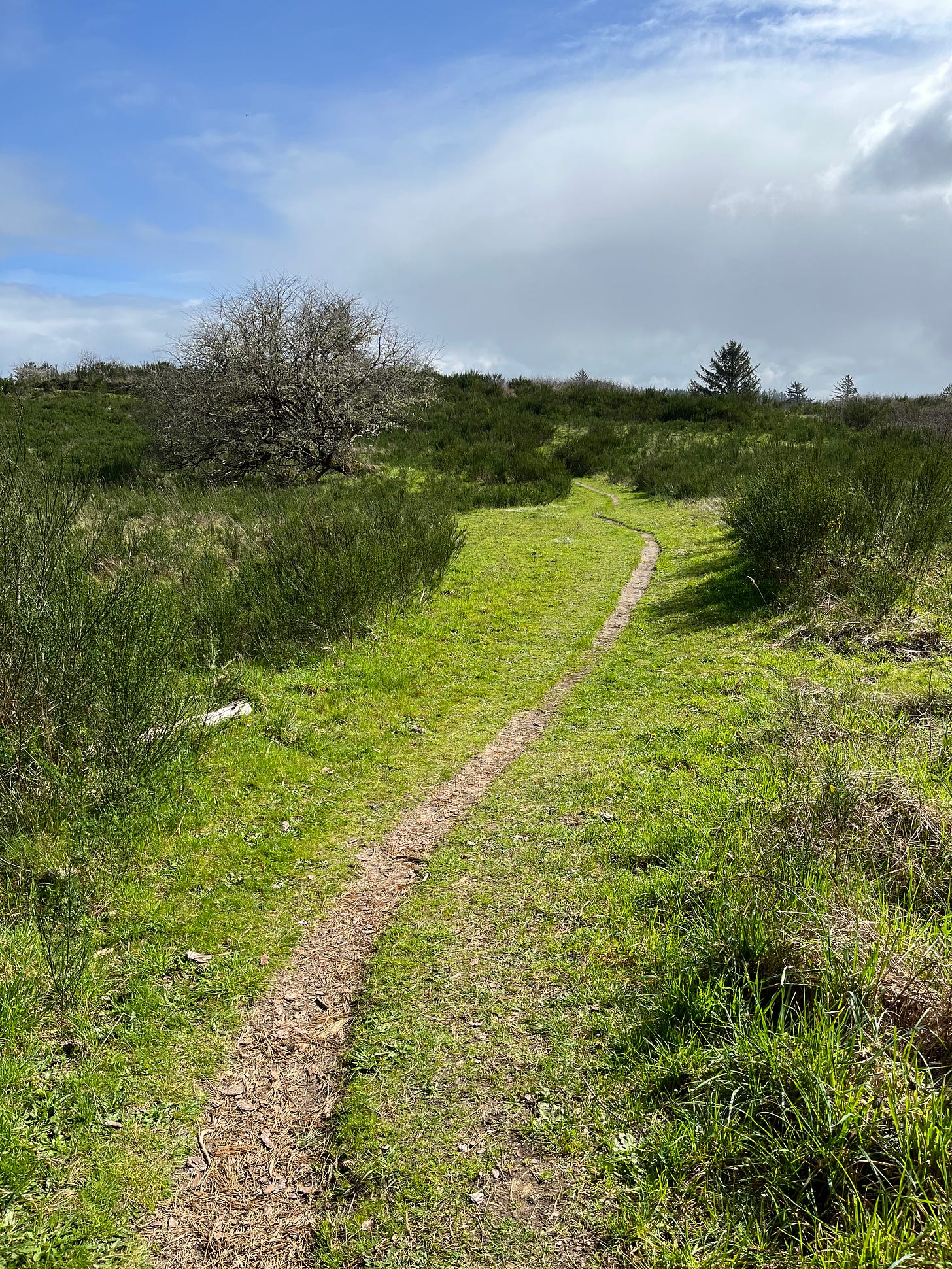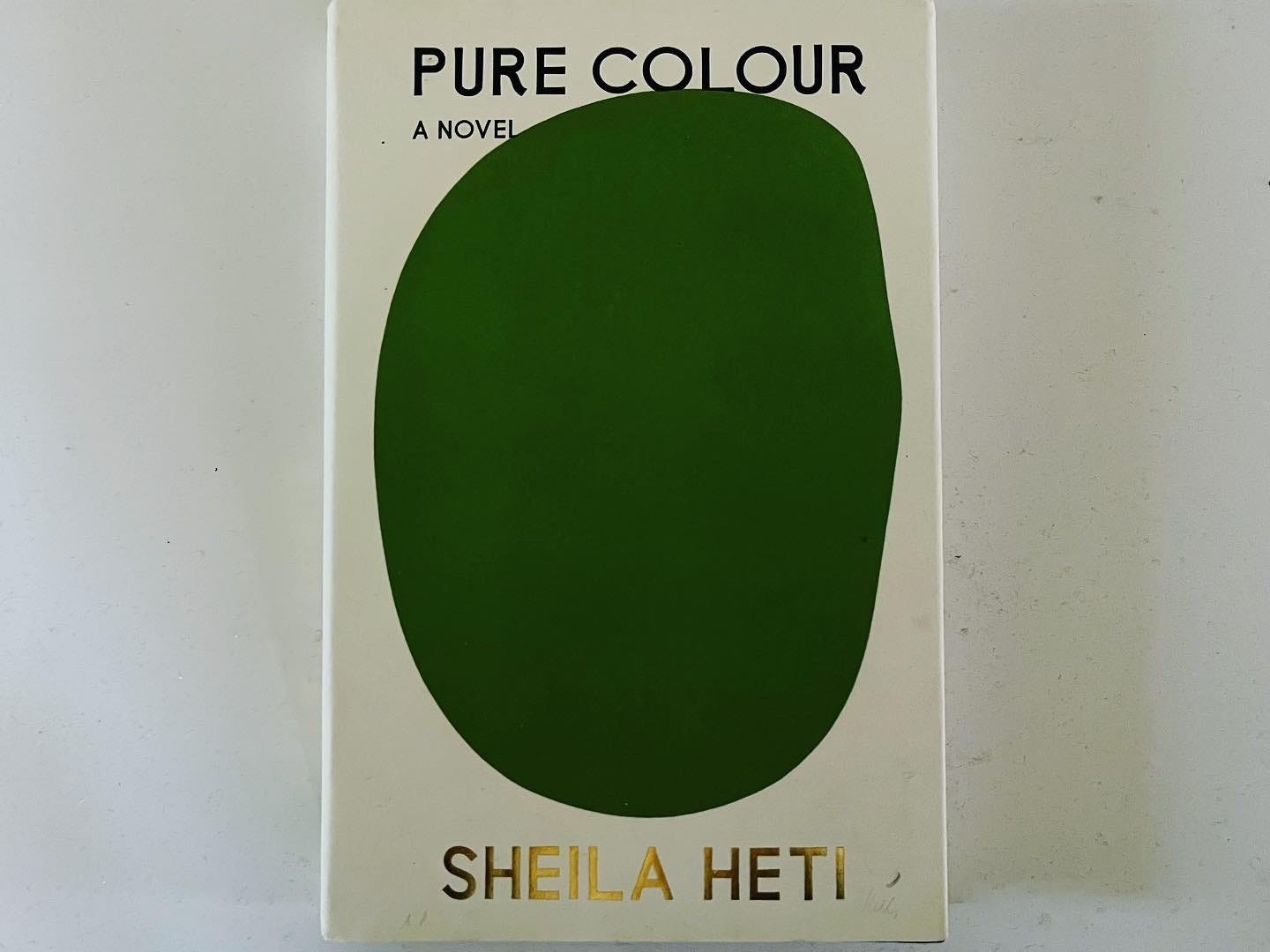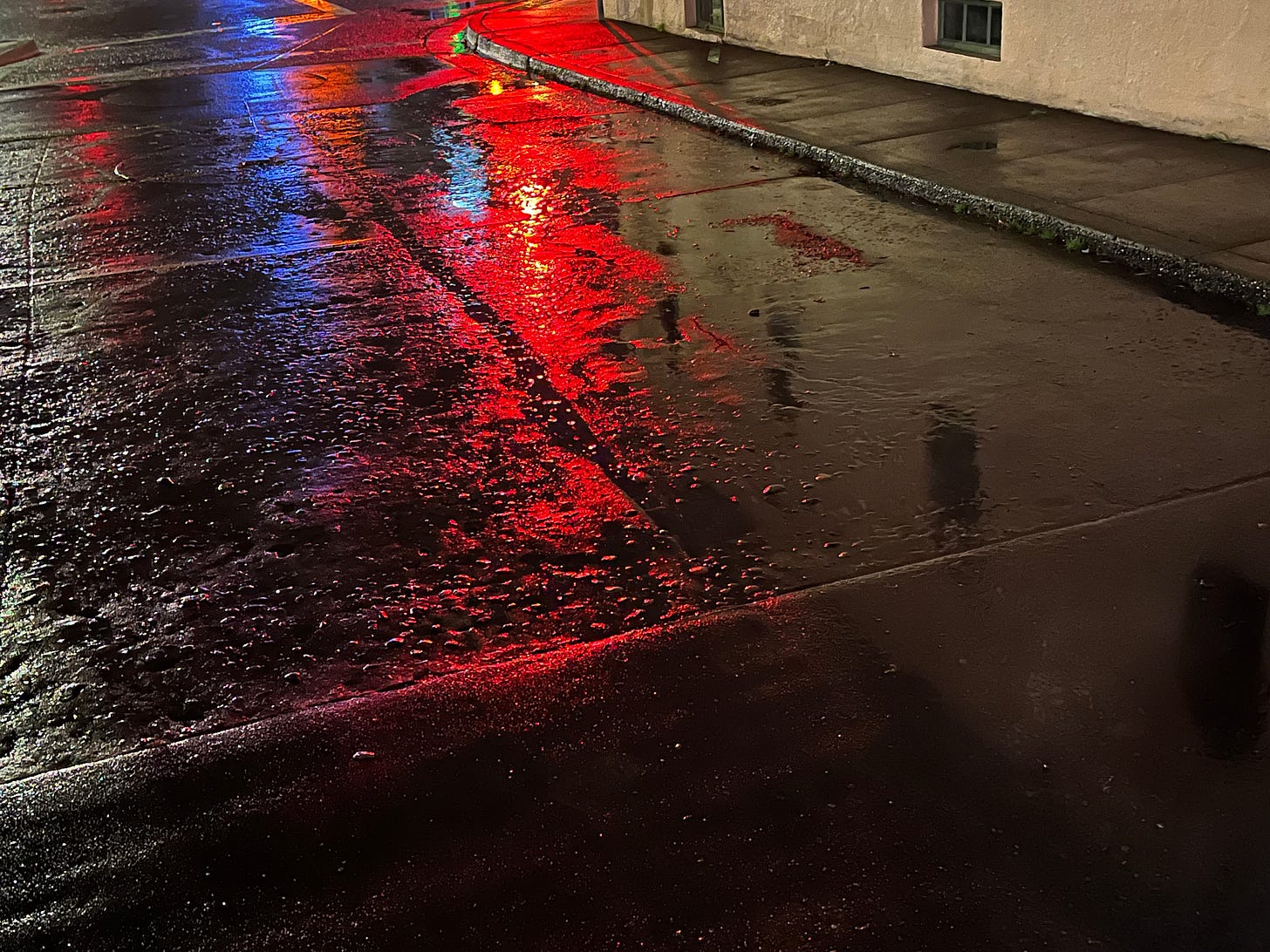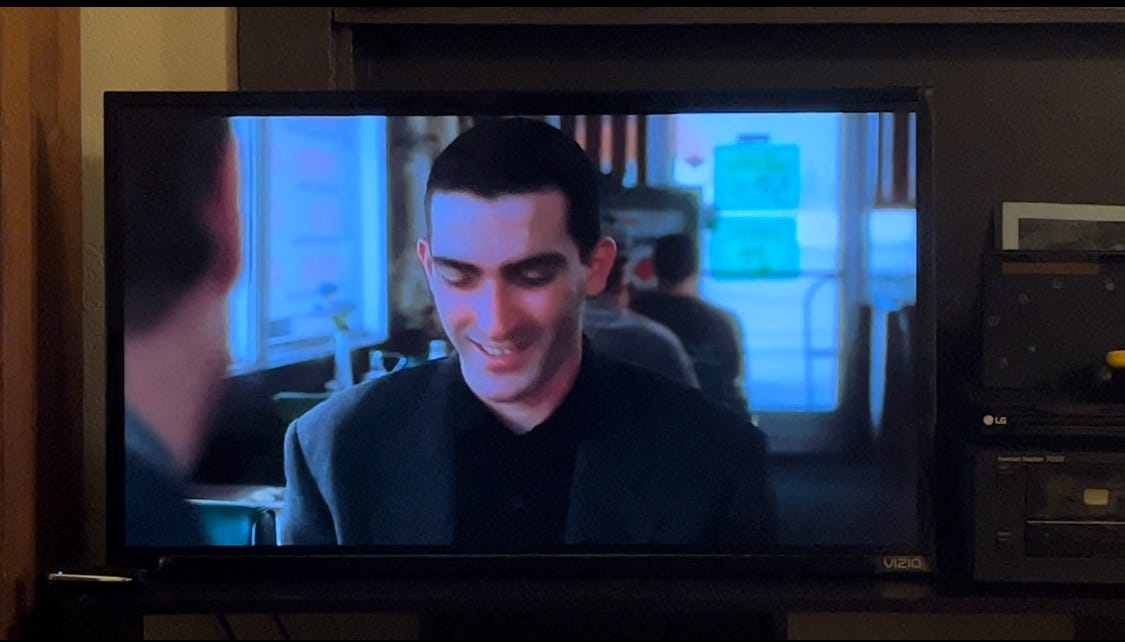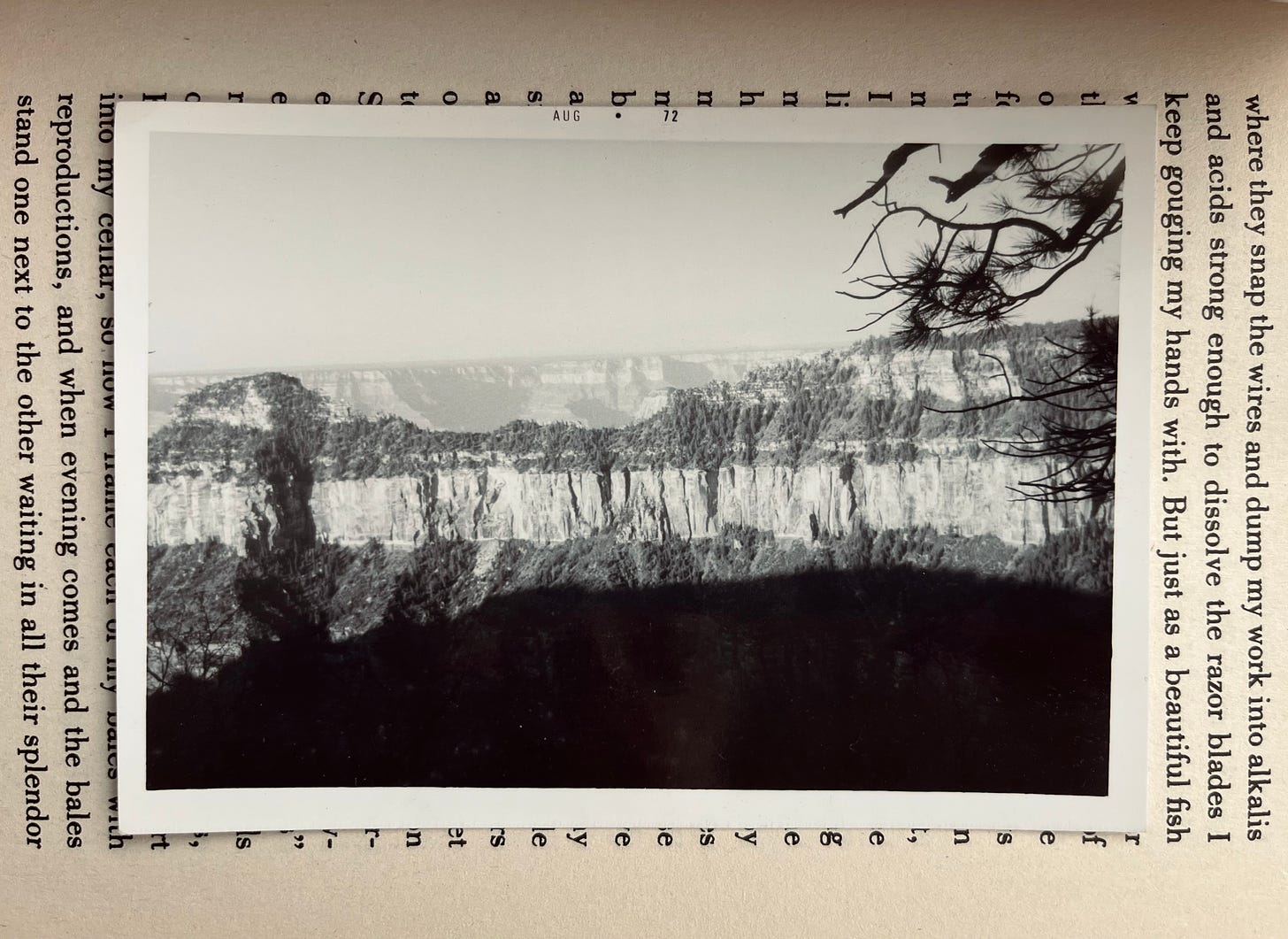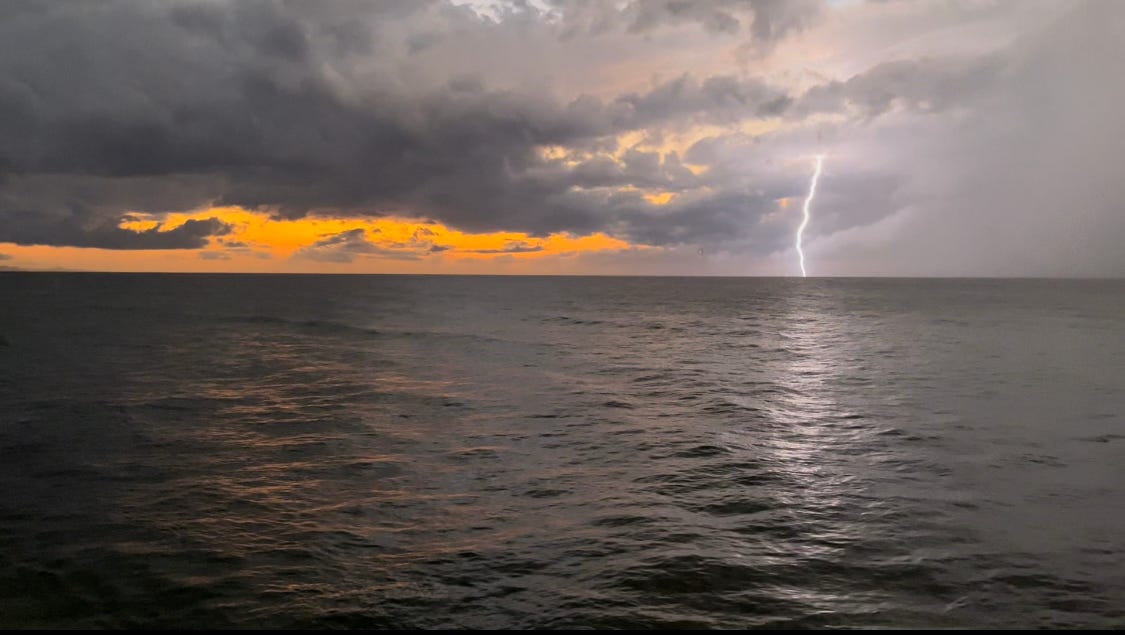A Walk
I’ve recently taken two walks where no thoughts entered my head; my mind was like an empty valley, where sounds and images passed through it, most notably, a prolonged moment, infinite and elastic, when the birds around me sounded like music, in a type of stereo setting impossible to replicate, or describe.
As such, I am going to skip the “walk” section on this issue, and post a short essay instead.
Essay
It wasn’t long ago that there was no global pandemic we were aware of, nor was there war with Ukraine; and we can rewind even further to a period where Trump was an impossible figure, a punchline in fact. It’s astonishing how abruptly small details can shake the very foundation of our reality.
Only recently I was scrolling through social media and saw a post from someone who believes we are in the apocalypse at this very moment. Not apocalyptic times as a metaphor, but an actual cosmic or religious end to the planet. I tend to disagree, but its hard not to see the writings on the wall, everywhere one turns.
There’s something about our current global situations (or traumas) which have put this “apocalypse” into the foreground, whereas just a few years ago, most of the catastrophic violence the planet faces daily sat in the background like a piece of elevator music, or static behind a tv set. Things such as global warming, gun violence, income inequality, racism, extremism — these existed as strongly before Trump and before Covid, but in the recent past, they were regulated to a kind of distant hum, an ambience even, similar to what Erik Satie once called “furniture music”, something that didn’t interrupt our thoughts. We were comforted and comfortable with what our systems were giving us, even as it was splitting us apart from our humanity. I remember shortly before the new year of 2020, talking to a cousin of mine, whose thoughts could be considered nothing short of “magical thinking”, and who told me that 2020 would be the year of clarity, of “20/20” vision. She said this in an optimistic, utopic way; and it occurred to me many times during the pandemic and the protests that followed it, that she was right; but that the clarity didn’t bring out a utopia — instead it pushed the dark things we’ve been ignoring into the foreground. As such, we are a society that is split between those seeing clearly for the first time, and those falling into a deeper sleep than normal, a sleep of conspiracy and “alternate facts”; although I tend to believe there are more in the former than the latter. We are in a rare moment of wakefulness, which can perhaps lead to a meaningful change. Although of course that isn't a guarantee.
Back when the apocalypse resided in the background, pieces of pop culture would occasionally bring these moral problems into our awareness. They would touch on the “zeitgeist” as critics call it. When I was a teenager, The Matrix vocalized our thoughts on reality, computers, and its interactions with capitalism and consumer culture (this movie came out before physicists imagined our lives might be part of a video game; and its easy to wonder if that theory would even exist without The Matrix).
More recently, income inequality expressed itself in the South Korean film Parasite, which became a surprise international hit, not only becoming the highest grossing film in its country, but winning the Oscar for best picture, the very first time a film in a language other than English won. The day after its surprise victory, I walked into a Korean grocery store, half by accident. The cashier, a modestly or even conservatively dressed middle age woman, not the kind of person one would expect to be a fan of violent surrealism, asked me if I had watched the Oscars. I told her I was excited for Parasite’s win. Her eyes lit up as she shared her enthusiasm with me. She hadn’t been able to sleep at all the night before, she was so exciting that she spent the evening texting and calling friends and family of hers overseas, telling them their film had just won a giant prize. It was something she was proud of, that was part of her.
My friend Rachel called this win the last big event before the pandemic, and I think she might be right. There was a glow of optimism that followed the victory, not unlike the glow that follows other globalist victories, moments we think the world might be connected and capable of large scale change; such as Obama’s first election. These glows can be short lived, but they are important to inhabit or walk around in. Invigorating even. That night, watching the Oscars, there might have been a subtle but very real thought that perhaps things weren’t doomed, perhaps Trump and Brexit were glitches rather than a new norm, perhaps there was still a thirst for social justice and international community.
A sliver of optimism might have followed us at the start of the pandemic as well; back when people spoke of dolphins in Venice, global peace, and a complete reassessment of values. In the United States, both Republicans and Democrats almost unanimously agreed on stimulus packages. But it didn’t take long for the fissures to creep in, and to naturally take over. After two years of this pandemic, now that our problems face us head on with a clarity that is startling, movies and literature don’t seem to want to tackle or bring these problems out, as they once did. It is almost frustrating that two years into something the entire globe is confronting, one never sees face masks in film or television; and the pandemic is rarely mentioned in music or literature either.
If art’s purpose was once to uncover hidden messages — then what happens when things are already clear, in the foreground? It seems to cause a reluctance for media creators to talk about or tackle them. I can think of small examples that acknowledge Covid-19. Both the endings of Worst Person in the World and Drive My Car reference it, albeit in subtle ways.
But most media ignores it, not least of which reality tv does, something I’m well aware of, as my job is to record sound for reality shows. I’m always shocked at how the “cast” as we call the non-actors on set, are told to not talk about covid; and remove their masks right before the cameras start rolling. It is as if the cast of reality shows live in a separate world then the rest of us. But its no wonder. I’ve often thought that reality television is just as escapist as superhero movies. If an authentic reality show came out, it would drive viewers away; as part of the subconscious appeal is to something wildly different than our lives — a fantasia that either consists of people we can judge, or of fantasies of youth, money, sex, and vacation. In fact, I’ve recently wondered if the term “reality television” helped Americans get used to living in a society without objective truths, one of many societal terms we’ve negotiated that are oxymorons. Its no surprise that the last president, elected without the popular vote, was also a reality star.
At this very moment, I am on the set of a reality tv show, in a third world country, and I had a moment after last night’s dinner, when it was easy to see that staff members of the hotel wanted to go home, but were hired by production to keep their restaurant open late for us, where I felt as if I was one of the elite and wealthy characters in the film Parasite, and the emotion I had from this was something similar to shame, seeing myself reflected in a mirror I didn’t want to stand in.
Part of the appeal of Parasite was in showing how banal activities separate the classes (and perhaps also in taking a cynical viewpoint that both classes are made self-serving and ultimately barbaric by capitalism). It felt that way last night, and it felt that way this morning, when my jog on the beach was constantly interrupted by locals scrambling to get my attention, to get hired for a tour, a massage, or simply to sell me sea shells. These constant interruptions seemed to transform a tranquil activity I generally find meditative, an activity that is refreshing but also an escape, into a clear view of the system I live in and the part I play in it, whether I like it or not. Perhaps my feeling this morning is the feeling Hollywood execs imagine a population might face if they turn on the Kardashians and see them wearing a KN95 mask or adhering to social distancing measures, these executives imagine that viewers don’t want another image showing that the world as they know it might be coming to some sort of end.
***
April 21 - May 4, 2022
Inventory.
Sheila Heti. Pure Colour. US. 2022. 5 enthusiastic stars
A masterpiece.
This book is so pure and tender that it enters the realm of generosity. Heti is generously giving us a glimpse into both her soul and her unique mystical philosophy. The novel is about grief — for her dead father, for a dying planet, and for a doomed relationship — and yet it is not a heavy read; instead it is light, it is almost “unbearably light” as Kundera would say — she throws her grief under a curtain of love and glass and something approaching wonder; and the novels levity provokes tears , reflection , and a state of psychedelia — many times while reading this I would look up from the page and experience a similar sensation as microdosing or prolonged meditation. The prose is experimental, avant garde, very mystical, exploratory; but also inviting, playful, and innocent. It frames destruction under a thought that God is an artist and this planet and humanity are a flawed first draft, which God will soon destroy to replace with a better draft of life, one without death love birth or families. And so perhaps the pain is worth it, to be in this draft. The format is one of short bursts of thought. Each page is like a mini chapter. There’s a 20-30 page moment where the protagonist becomes a leaf. It’s always unexpected. The entire thing feels so overwhelmingly honest, and all the metaphors so unique and eccentric, that I think the best words for this book are the aforementioned “generous” but also “brave”. Her ability to explore her emotions thoughts and grief so nakedly and share them is courageous. It is also very funny, and is like the literary equivalent of a Talking Heads album. Among the best things I’ve read in years. Highest recommendation.
Films:
I recently revisited two old favorites of mine, one on the big screen and one on the small, and seeing how different they become as I grow up with them was a profound experience.
In the Mood for Love (Wong Kar-Wai, 1999); feels like a beautiful song, one not unlike the violin piece that appears throughout it. As the title suggests, the film consists of one long sustained mood and it is masterful at exploring this emotion, which is not one of love, but rather one of the longing for love, and the longing for connection that goes along with it. It does so without conventional narrative; but instead with long exquisite shots, which feel as sophisticated as the wardrobe each of the two actors wear. As many of my favorite movies do, this film exists in a sort of dream space — a world invented and inhabited by cinema. There is glamor and smokiness that echoes other films, as much as it echoes life.
I loved this movie when I saw it in the early 2000s; but I didn’t quite “get it” the way I did the other week at Hollywood Theater, when a new and gorgeous 35mm print screened. After watching the film, I went on a rainy evening walk and the streetlights on the puddles reminded me of the movie. Like many good pieces of art, In the Mood for Love can transform the way one views the world, even if only temporarily.
Also non-linear, but with a very different emotion is David Lynch’s Mullholland Drive, which I’ve often called one of my favorite movies. I was afraid that its appeal would be diminished now that I’m 40 years old, and as such I’ve been somewhat afraid to rewatch it, not wanting to spoil a special memory of my youth. But I’m happy to say that although it doesn’t have the emotional heft of Wong Kar-Wai, it still is so well made and executed that the magic does not diminish. It is not, in other words, simply a flashy piece of surrealism. It is rich in its archetypal imagery, containing keys, cowboys, boxes, doppelgängers, and in one of my favorite scenes of all time, a daytime diner that descends into a horrifying nightmare.
Rewatching these films gave me the realization that my generation grew up with film masters of our own. I’ve always believed that the “canonical” artists are gone — yet I now think that Lynch and Wong Kar-Wai are as good as Bergman or Godard; at least they are my generation’s version of that. Coming to this realization made me immensely happy; and also, proud. It also makes me aware that in the future one might say the same about Ryusuke Hamaguchi, Hong Sang-soo, or others.
Also watched recently:
3 Women (Robert Altman. 1977). 4 1/2 stars.
The Worst Person in the World (Joachim Trier. 2021). 4 stars.
Spencer (2021). 4 1/2 stars
Kimi (Steven Soderbergh. 2022). 3 stars
Note: This is the first movie I’ve seen that directly acknowledges the pandemic. As you can see in my essay, I’ve been wanting a film like this one. Unfortunately I was a little disappointed by it; though it did have moments.
High and Low (Akira Kurosawa. 1963). 4 1/2 stars
The Batman (2022). 3 1/2 stars
Speaking of High and Low, the newest Batman movie seems to have a nod to it toward the end. Of all the Batman films, this one has the best “tone.” But it was also the least enjoyable, and had an unnecessarily long running time. A movie like this makes me bored stiff after the first hour; whereas Drive My Car, with a similar running time, keeps me engaged and hypnotized with its surprises and authenticity.
***
Epilogue / conclusion:
I did not intend for this “issue” to arrive so late — but I kept deleting and rewriting versions — I drafted an essay on book clubs, on my “selfish” reading habits, a deeper dive into reality television, and two pieces on separate walks — a birthday hike with my brother, and a walk along the coast I took the day after finishing my new album.
I’ve been slowly writing this in the mornings before I go into work, from my hotel on location. But my thoughts are also on the excitement of the new music I finished; which I can’t wait to share
Also, I wrote this before the announcement that the Supreme Court might set human rights in my country backward by 50+ years. I am disturbed and unsettled by this news, it makes me very emotional to see the cruelty humans and the powerful can possessed, especially when it’s not based on a democracy at all (five of the nine judges were appointed by presidents who lost the popular vote). It makes me nauseous and I think about it as I take photos of plant life and ocean waves in this third world country.
The next issue will be out sooner. Thank you for reading and subscribing.



